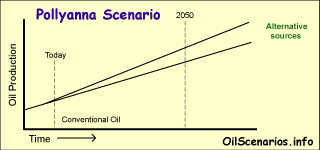
Pollyanna Scenario
Oil production can be increased to meet all future demands for at least 40 years (Details and links to articles)
World economic growth can continue without energy constraints. While eventually oil production may be reduced that time is far in the future (30+ years) and by that time alternative energy sources such as solar, wind, fuel cell, and maybe even fusion technology will have been developed.
There are two versions of the Pollyanna Scenario: 1) those that believe that future oil finds and technological advances will allow conventional oil production to continue to increase through 2040-2050 at which time a peak will finally be reached and 2) those that believe that oil is of abiotic origin and it essentially unlimited in supply in the mantle and will continue to replenish many oil fields for hundreds of years. The second more extreme view results from a view that oil is not limited by the amount of biotic life in the past as oil is, in their view, formed naturally deep in the earth.
Crying Wolf: warnings about oil supply Michael Lynch
Closed Coffin: Ending the Debate on "The End of Cheap Oil" A commentary Michael C. Lynch, Chief Energy Economist, DRI-WEFA, Inc (2001)
Recent Presentations by the EIA Administrator and EIA Staff This is a link to a page with power point presentation given by various EIA (Energy Information Agency) personal. These give a very good overview of a US agencies general energy outlook. At times these views can verge on resembling a Pollyanna scenario although most would probably best be places within the generally optimistic approach.
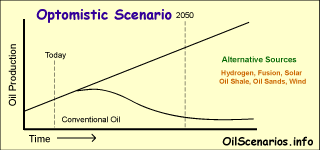
Optimistic Scenario
Oil production may slow or even decrease but when combined with conservation and alternative resources it will be possible to meet the growing energy demands of society for the foreseeable future (Details and links to articles)
World economic will continue but only with large capital investment in additional hydrocarbon exploration along with large increases in non-conventional oil production as well as continued to advancement of alternative energy technologies. While some periods of tight oil supply may exist market forces will be adequate to stimulate increased oil production.
Crying Wolf: warnings about oil supply Michael Lynch 1999 at M.I.T. This article is one of the most quoted and referenced articles on the web by a well known oil industry economist who has long worked to refute the claims of peak oil advocates. This is probably the best article to read to get a feel for the connection of particular economic outlooks and how they effect or are effected by a particular view of future oil production.
Closed Coffin: Ending the Debate on "The End of Cheap Oil" A commentary Michael C. Lynch, Chief Energy Economist, DRI-WEFA, Inc (2001)
Long Term World Oil Supply Scenarios: The Future Is Neither as Bleak or Rosy as Some Assert By John H. Wood, Gary R. Long, David F. Morehouse. Aug 18, 2004. This publication of the US Energy Information Agency is probably the best representation of an generally optimistic to very optimistic outlook of estimated eventual oil recovery. The authors present a number of possible scenarios based on assumptions of future oil finds and recoverability of those finds. Below is a graph taken from the article that shows potential peak oil production years based on the probability of finding new oil reserves. There expectation is that significant new oil deposits will be found such that their "mean" value places peak oil in the year 2037. Taking their higher numbers would result in a something much closer to the Pollyanna scenario.
Related Books:
Power to the People : How the Coming Energy Revolution Will Transform an Industry, Change Our Lives, and Maybe Even Save the Planet by Vijay V. Vaitheeswaran. Although Vaitheeswaran sees changes in the energy climate those changes will work to the benefit of society. Ultimately this book is placed in the optimistic category with regards to energy because non-conventional and alternative energy sources are viewed as saving us from a real energy crunch or even plateau. A secondary effect, in the mind of the author, is that the change in energy sources will save us from many of the troubles of burning fossil fuels.
Energy at the Crossroads : Global Perspectives and Uncertainties by Vaclav Smil. Takes a optimistic view of long term prospects for energy production.
Rational Exuberance : Silencing the Enemies of Growth and Why the Future Is Better Than You Think by Michael Mandel. Combats the idea that there there are limits to economic growth in the near future.
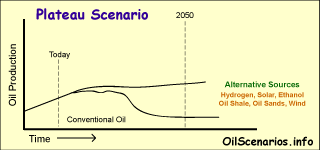
Plateau Scenario
Fossil fuel production will plateau in the next decade and alternative sources will not be able to significantly take the place of oil resulting in a volatile energy market and restricted world economy however people will be able to adapt lifestyles to the changing energy environment (Details and links to articles)
The production peak of oil is near (1-4 years away) however, market forces will allow the peak to become a plateau for several years allowing non-conventional and alternative energy sources to be developed to at least fill the gap when oil production begins to fall. However, overall growth of total energy availability is unsustainable in the long term resulting in slowed economic growth and pressure on underdeveloped societies attempting to increase their standard of living. The resulting stresses may lead to unstable world wide markets for many years and increase the chances of global conflict over limited resources.
Some might argue that we are in a plateu region right now. In 2005 and going into 2006 world oil production has remained relatively stable. Demand has fluctuted and been effected a number factors such as the hurricanes of 2005. The result is a rocking back and forth between a world slightly oversupplied to just undersupplied. The quesiton is what will happen when demand picks up as it seems it most surely will baring some global catastrophe? Will oil production be able to maintain pace or has conventional oil production essentially peaked already.
Representative Books:
Energy at the Crossroads: Global Perspectives and Uncertainties. by Vaclav Smil
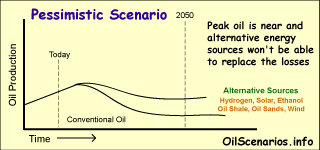
Pessimistic Scenario
Oil production will not meet demand, forcing conservation and alternative energy use over the next decade, however total energy resources will still decline slowly resulting in a gradually retracting world economy (Details and link to articles)
Oil production is already peaking or will reach its peak within four years. After oil production begins to drop even enormous efforts to drill and produce more oil will not be able counteract the depletion of the worlds largest oil fields. The result will be rapidly increasing oil prices which will bring on worldwide periods of depression that will draw down the energy demand just enough to keep outright shortages from being widespread. Nonetheless a long period of economic decline is expected eventually alleviated by new technology and turn over to use of alternative energy sources.
Pessimists view the occurrence of peak oil to be either imminent or very close. A turn to both non-conventional and alternative energy sources as not being possible on a large scale in the near future and thus there will be an unavoidable energy gap between demand and supply for the next 10-20 years.
The Coming Energy Crunch by By Aaron Naparstek. New York Press 2004. Written just before the 2004 presidential election this article very clearly sums up what the pessimistic scenario sees as the major issues for today's politicians.
The World Petroleum Life-Cycle. Richard C. Duncan and Walter Youngquist. This is a paper presented in 1998 to the Petroleum Technology Transfer Council at the University of California. Filled with easy to understand graphics that examine when different continents will experience peak oil production it is interesting to compare their predictions made in 1998 to what has happened in these locations since. A .pdf version of this paper can be bound HERE.
The Ugly Oil Supply Scenario by Glenn Morton. Written in 2002 Morton presents an overall picture of the evidence for peak oil and a picture of how an oil crisis might play out within this decade. Slightly outdated data now but Morton is an insider in the oil industry and so does have an interesting perspective. As with Campbell below, some aspects of Morton's view fit with the Head for the Hills Scenario.
The Peak Oil Debate: Crisis or Comedy by Matthew Simmons. PDF version of a presentation given at a conference in September 2004 by energy industry investment banker Matt Simmons. Simmons has been a leading advocate of the dangers of peak oil. He runs one of the largest investment firms that specializes in financing the energy industry and has served Vice President Dick Cheney's energy panel.
Peak Oil: an outlook on crude oil depletion by C. J. Campbell revised 2002. Campbell is the father figure of the coming oil crisis advocates. He has written and lectured extensively on the topic and is the most widely quoted individual in the debate. His book "The Coming Energy Crisis" is a must read for those that want to understand the peak oil position. Here we characterize his position in the "Pessimistic Scenario" but many aspects of his writings would place him as comfortably in the Head for the Hills Scenario.
Web pages of interest:
Oil Depletion Analysis Center (ODAC): is an independent, UK-registered educational charity working to raise international public awareness and promote better understanding of the world's oil-depletion problem. A simple, well organized, informative web site.
Association for the Study of Peak Oil (ASPO): Most complete web site representing a peak oil view. Founded by the accepted leader of the peak oil movement, Colin Campbell. The monthly newsletter are filled with a large amount of industry data and analysis.
The DryDipstick: A metadirectory for peak oil that contains a huge number of links to current articles on peak oil and other oil data.
PeakOil.com: A news and message boards site where members post articles and information, on a daily basis, that bears on the oil depletion debate. This is a good place to go to see the most current discussion usually from pro-peak oil point of view.
Glenn Morton's Oil Crisis Page: This site has a number of writings by an industry insider who examines some of the data on oil production and directly addresses many of the assumptions of the oil optimists.
Book length treatises:
Hubbert's Peak: The impending world oil shortage by K Deffeyes (2001) Professor Emeritus Princeton University. A very good introduction to the the oil industry covering basic aspects of how oil is found and extracted. With the necessary background Deffeyes then explores Hubbert's historical projects and assesses whether his approach can be applied at a global scale. This book is both helpful to a novice to the oil question but also provides enough novel insight that it would be helpful to even those that are quite familiar with the basic concepts. A follow-up book, Beyond Oil goes "beyond" his first book and looks at possible scenarios for how the world enery scene will play out.
The Coming Oil Crisis by C. J. Campbell (2004). The most comprehensive overview of the peak oil position written by a true believer.
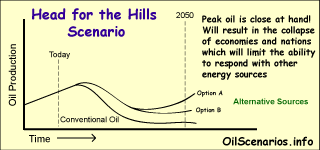
Head for the Hills Scenario
Oil production will peak and decline rapidly in the near future resulting in widespread energy shortages resulting in catastrophic collapse of many elements of modern society due to our lack of preparation (Details and links to articles)
World oil production is very close to peaking. Following peak oil rapid reduction in oil production is expected that no economic forces or zeal for developing alternative energy sources will be able to compensate for. The resulting energy crunch will lead to the destabilization of world economic markets and greatly increase the likelihood of global armed conflict over the remaining oil and gas fields.
The figure below shows oil production dropping on the near future with alternative energy sources not picking up the slack. According to this view oil supply will fall before alternative sources can be developed to replace the loss of oil resulting in such a significant energy gap that social turmoil is inevitable. In this figure alternative sources are not seen as catching on even in the future because of the degradation in society making the need for large amounts of energy not even necessary. A slightly more positive outlook might have alternative sources allowing for new population growth and thus energy consumption growth as we head out toward 2050 and beyond.
(please note that each link only represents aspects of this view. For example Campbell ("The end of cheap oil") paints a gloomy pictures of the future of oil but this doesn't necessitate that we all "head for the hills."
The DryDipstick: A web site for peak oil that contains a huge number of links to articles on peak oil and other oil data. Many of the articles listed would be placed in the pessimistic category rather than the more extreme category.
Wolf at the door: UK website whose subtitle is "A beginners guide to oil depletion" Some of the data is the same as presented here but all of it is presented within the context of a distinctly pessimistic outlook. A good place to look if you want to see how some people are preparing for the complete breakdown of society due to oil depletion.
The Busby Report: Another UK site containing an analysis of societal changes in the UK due to oil depletion.
Life after the Oil Crash. A very pessimistic site with an associated book dealing with how to cope with the impending oil crash.
The End of Cheap Oil: Article from Scientific American, March 1998 by Colin J. Campbell and Jean H. Laherrere. This article is one of the most prominent mainstream writings that made a big impact in increasing awareness of the peak oil movement.
Books reflecting a doomsday viewpoint:
The Party's Over and PowerDown: Options and Actions for a Post-Carbon World both by Richard Heinberg. Heinberg who is a faculty member of New College Of California (Santa Rosa) brings a distinctly pessimistic view to the eventual consequences of peak oil.
The Oil Factor by Leeb & Leeb (2004).
Oil, Jihad and Destiny : Will declining oil production plunge our planet into a depression? by Ronald R. Cooke
Related Books: (links to Amazon.com)
Collapse of Complex Societies (New Studies in Archaeology)
by Joseph Tainter, Colin Renfrew (Editor), Wendy Ashmore (Editor), Clive Gamble (Editor), John O'Shea (Editor)
The 2030 Spike by Colin Mason (2003)